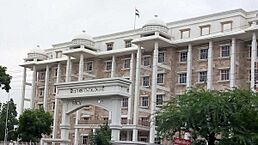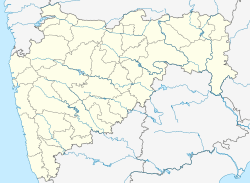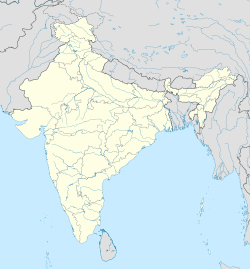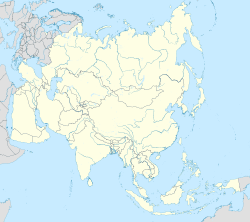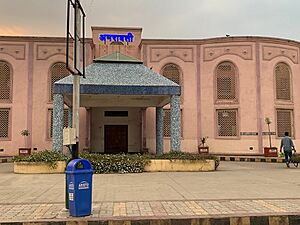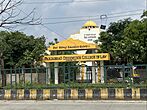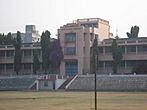Amravati facts for kids
Quick facts for kids
Amravati
|
|
|---|---|
|
City
|
|
|
Amravati Bridge, Amravati University, Amravati Court, Melghat Lake, Melghat tiger reserve, Ekvira Temple, Board Office Amravati, Melghat Tiger
|
|
| Nickname(s):
Amba Nagari
|
|
| Country | |
| State | Maharashtra |
| District | Amravati |
| Government | |
| • Type | Municipal Corporation |
| • Body | Amravati Municipal Corporation |
| Area | |
| • Total | 121.65 km2 (46.97 sq mi) |
| Area rank | 2nd in Vidharbha |
| Elevation | 343 m (1,125 ft) |
| Population
(2011)
|
|
| • Total | 646,801 |
| • Rank | India: 70th Maharashtra: 14th Vidarbha: 2nd |
| • Density | 3,524/km2 (9,130/sq mi) |
| Demonym(s) | Amravatikar |
| Languages | |
| • Official | Marathi |
| Time zone | UTC+5:30 (IST) |
| PIN |
444 601 - 444 607, 444701, 444901
|
| Telephone code | +91-721 |
| Vehicle registration | MH-27 |
| Distance from Nagpur | 152 kilometres (94 mi) (land) |
| Distance from Mumbai | 663 kilometres (412 mi) (land) |
| Literacy Rate | 93.03% |
| HDI | Medium |
Amravati is a city in the Maharashtra state of India. It is located in the Vidarbha region. Amravati is the ninth largest city in Maharashtra. It is also the second largest city in the Vidarbha region by population.
The city is the main administrative center for Amravati district and Amravati Division. This division includes several districts like Amravati, Akola, Buldhana, Washim, and Yavatmal. Amravati is also one of the cities chosen for India's Smart Cities Mission.
Contents
What's in a Name?
The old name for Amravati was "Udumbravati." This name changed over time to "Umbravati" and then to "Amravati." Some people believe the city got its name from the ancient Ambadevi temple located there.
A Look Back in Time
People have lived in Amravati since at least the 11th century. We know this from a marble statue of a Jain holy figure, Rishabhanatha, which was placed there in 1097.
In the 13th century, the area around Amravati was ruled by the Hindu Yadava King of Devagiri. Later, in the 14th century, Amravati faced a severe drought. Many people had to leave and move to other places like Gujarat and Malwa. After some years, people were brought back to help rebuild the city.
In the 16th century, the Mughal emperor Aurangzeb gave land for a mosque, which shows that both Muslims and Hindus lived together peacefully in the area. In 1722, Chhatrapati Shahu Maharaj gave Amravati and Badnera to Shri Ranoji Bhosle. Ranoji Bhosle helped rebuild the city, making it grow and become successful.
The British general Colonel Wellesley once camped near Amravati. People still call that spot "camp." After the 18th century, Amravati became a proper city. It was governed by a union of the Nizam and Bhosle states. In 1803, British forces took control of Gavilgad Fort. Around 1805, the city was attacked by a group called the Pindāri.
In 1983, Amravati became the second Municipal corporation in the Vidarbha region. It is about 663 kilometers (412 miles) east of Mumbai, the state capital. It is also 152 kilometers (94 miles) west of Nagpur. This makes Amravati the second largest city in the Vidarbha region after Nagpur.
City Layout and Nature
Amravati is located at 20°56′N 77°45′E / 20.93°N 77.75°E. It sits about 343 meters (1125 feet) above sea level. The city is about 156 kilometers (97 miles) west of Nagpur. It is the main administrative center for Amravati District and Amravati Division.
The city is near hills that separate cotton-growing areas. Chikhaldara, the only hill station in the Vidarbha region, is about 80 kilometers (50 miles) from Amravati. The city covers an area of about 50.5 square kilometers (19.5 square miles).
Weather in Amravati
Amravati has a tropical wet and dry climate. This means it has hot, dry summers and mild to cool winters. Summer lasts from March to June, the monsoon (rainy) season from July to October, and winter from November to March.
The hottest temperature ever recorded was 49.1°C on May 25, 2013. The coldest was 5.0°C on February 9, 1887.
| Climate data for Amravati (1981–2010, extremes 1901–2012) | |||||||||||||
|---|---|---|---|---|---|---|---|---|---|---|---|---|---|
| Month | Jan | Feb | Mar | Apr | May | Jun | Jul | Aug | Sep | Oct | Nov | Dec | Year |
| Record high °C (°F) | 38.0 (100.4) |
38.9 (102.0) |
43.9 (111.0) |
46.1 (115.0) |
48.3 (118.9) |
46.7 (116.1) |
40.2 (104.4) |
40.5 (104.9) |
38.9 (102.0) |
42.6 (108.7) |
37.4 (99.3) |
35.6 (96.1) |
48.3 (118.9) |
| Mean daily maximum °C (°F) | 29.2 (84.6) |
31.9 (89.4) |
36.2 (97.2) |
40.2 (104.4) |
41.7 (107.1) |
36.5 (97.7) |
31.0 (87.8) |
29.7 (85.5) |
31.4 (88.5) |
32.8 (91.0) |
30.9 (87.6) |
28.9 (84.0) |
33.4 (92.1) |
| Mean daily minimum °C (°F) | 15.3 (59.5) |
17.0 (62.6) |
20.6 (69.1) |
23.4 (74.1) |
26.1 (79.0) |
24.3 (75.7) |
22.5 (72.5) |
22.0 (71.6) |
22.1 (71.8) |
20.4 (68.7) |
17.6 (63.7) |
15.1 (59.2) |
20.5 (68.9) |
| Record low °C (°F) | 6.1 (43.0) |
5.0 (41.0) |
8.9 (48.0) |
12.8 (55.0) |
17.0 (62.6) |
17.0 (62.6) |
16.8 (62.2) |
15.6 (60.1) |
16.8 (62.2) |
12.0 (53.6) |
8.9 (48.0) |
7.8 (46.0) |
5.0 (41.0) |
| Average rainfall mm (inches) | 11.4 (0.45) |
7.8 (0.31) |
15.4 (0.61) |
7.0 (0.28) |
8.2 (0.32) |
128.6 (5.06) |
188.2 (7.41) |
206.6 (8.13) |
125.1 (4.93) |
61.9 (2.44) |
14.3 (0.56) |
7.3 (0.29) |
781.8 (30.78) |
| Average rainy days | 0.8 | 0.6 | 0.8 | 0.7 | 1.2 | 6.3 | 10.3 | 10.9 | 8.4 | 2.7 | 0.8 | 0.5 | 44.0 |
| Average relative humidity (%) (at 17:30 IST) | 45 | 40 | 35 | 29 | 30 | 51 | 71 | 76 | 69 | 54 | 52 | 53 | 51 |
| Source 1: India Meteorological Department | |||||||||||||
| Source 2: Government of Maharashtra | |||||||||||||
Amravati was ranked the 2nd best "National Clean Air City" in its category in 2024. This shows its efforts to keep the air clean.
People of Amravati
In 2011, the population of Amravati City was 646,801. There were 330,544 males and 316,257 females. For every 1000 males, there were 957 females. About 62,497 people were aged 0–6 years. The literacy rate, meaning people over 7 years old who can read and write, was 93.03%.
Religions in Amravati
The main religion in Amravati is Hinduism, followed by 61.8% of the people. Islam is followed by 23.7%, and Buddhism by 12.8%.
| Year | Male | Female | Total Population | Change |
|---|---|---|---|---|
| 2001 | 284247 | 265263 | 549510 | - |
| 2011 | 329992 | 317065 | 647057 | 17.752 |
| Religion in Amravati City (2011) | ||||
|---|---|---|---|---|
| Religion | Percent | |||
| Hinduism | 61.83% | |||
| Islam | 23.73% | |||
| Buddhism | 12.87% | |||
| Others | 1.58% | |||
Getting Around Amravati
Roads
The Amravati Municipal Corporation runs star city bus services. You can also find private auto rickshaws and cycle rickshaws. Amravati was the first city in the Vidarbha region to start a special city bus service just for women.
The Maharashtra State Road Transport Corporation (MSRTC) provides bus services for travel between cities and states. Many private companies also offer bus services, especially on busy routes like Amravati – Pune and Amravati – Indore. You can take a bus from Amravati to many other cities like Nagpur, Mumbai, and Hyderabad.
National Highway 6, which connects Hazira to Kolkata, passes through Amravati. New Star City Buses have replaced the older city buses.
Railways
Amravati has three railway stations:
- Amravati railway station: This station is in the city center and is the end of a railway line.
- New Amravati railway station: This station was opened in 2011. It was built when a new railway line connected Badnera junction to Narkhed.
- Badnera Junction railway station: This station serves the Badnera area of Amravati. It is an important junction on the Howrah-Nagpur-Mumbai line.
Airport
The Dr. Panjabrao Deshmukh Airport Amravati is located at Bellora, about 15 kilometers from National Highway 6. It is managed by the Maharashtra Airport Development Company (MADC). Currently, there are no regular commercial flights. The airport also has a helipad. MADC is planning to expand the airport.
Learning in Amravati
Amravati has many educational institutions, including:
- Dr. Panjabrao Deshmukh Memorial Medical College
- Dr. Punjabrao Deshmukh Polytechnic College
- Government College of Engineering, Amravati
- Government Polytechnic Amravati
- Hanuman Vyayam Prasarak Mandal
- Hanuman Vyayam Prasarak Mandal's College of Engineering and Technology
- P. R. Patil Group of Educational Institutes
- Sant Gadge Baba Amravati University
- Shivaji Education Society
Sports in Amravati
Territorial Army Parade Ground
This stadium is used for many sports, including football and cricket. It was once called the Reforms Club Ground. The Territorial Army, a part of the Indian Army, owns and manages the ground. The first recorded cricket match here was in 1958.
The stadium hosted one Ranji Trophy cricket match in 1976. In this match, the Vidarbha cricket team played against the Rajasthan cricket team.
Hanuman Vyayam Prasarak Mandal Ground
This ground also has a cricket field. It hosted one first-class match in the 1980/81 Ranji Trophy. In that game, the Vidarbha cricket team played against the Rajasthan cricket team, and Rajasthan won.
Famous People from Amravati
- Asif Basra
- Suresh Bhat
- Manzar Bhopali
- Mohan Choti
- Nagarjuna
- Bhagwan Dada
- Pranawachandra Deshmukh
- Punjabrao Deshmukh
- Sunil Deshmukh
- Bharat Ganeshpure
- Gajanan Jagirdar
- Moropant Vishvanath Joshi
- Waman Gopal Joshi
- Gadge Maharaj
- Tukdoji Maharaj
- Vikas Mahatme
- Pratibha Patil
- Jitesh Sharma
- Shripad Balwant Tambe
- Shiv Thakare
- Prabhakar Vaidya
- Tanveer Ghazi
See also
 In Spanish: Amravati para niños
In Spanish: Amravati para niños
 | James B. Knighten |
 | Azellia White |
 | Willa Brown |



